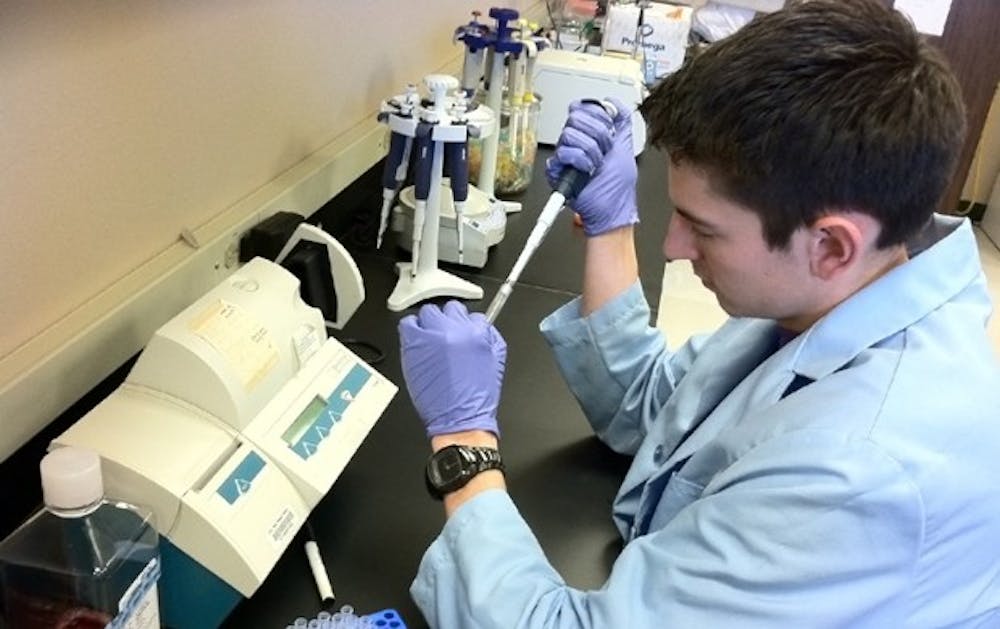There is perhaps only one thing harder to get than a chance to do funded, self-guided research as an undergraduate — a job in your field after you graduate. But a West campus-based program in only its second year has already helped ASU students do both.
New College Undergraduate Inquiry and Research Experiences — or NCUIRE, if that’s easier — is a program that pairs undergrads with great research proposals to faculty members, letting them get a paid internship in the field of research. According to director Todd Sandrin, it’s a place where innovative teaching and innovative research meet.
“The real problems of the world are not focused on just one discipline,” says Sandrin, a 38-year-old professor who has taught life sciences and chemistry at ASU for three years. “This program really leverages the interdisciplinary nature of this college, and shows students the value of it.”
If you’re looking for a small, student-success story that acts as a metaphor for what ASU wants to stand for right now, NCUIRE is probably the place to look. It’s focused on innovation and research that can be used right away in the real world. It’s focused on helping students get experience in college, and a job afterward. It’s very new, and very promising. Any student from any major can apply; grants are rewarded on the merits of the proposal, and nothing else.
Chad VanPelt, a post-baccalaureate pre-med student in his third year at ASU, is the student representative on the board that reviews NCUIRE proposals. He says making undergrads hirable is a big part of why the program makes sense at the University.
“We’re sort of reluctant to say that’s the goal, because that sounds jaded,” VanPelt says. “But ultimately it is to get the experience in school to increase your chances [of getting hired] after graduation.”
Those chances increased to 100 percent for Stephen Calvert, a 21-year-old applied computing (network distribution processes) senior.
The research proposal (Calvert’s first) began as a look at wireless communication devices and their wireless systems, but evolved into the topics of network security and “handshaking,” which Calvert explains as transferring one wireless access device to another to keep one device from slowing down.
Feng Wang, assistant professor in the applied computing (ACO) program at ASU West and faculty advisor for Calvert’s NCUIRE proposal, confirmed via email that his research into security issues in Wi-Fi networks has already landed him a job offer from network consulting company Terra Verde Service. She says Calvert’s example has inspired two more students to take NCUIRE positions under her this year.
Calvert says Dr. Sandrin and the rest of the NCUIRE board let him finish his research early to take up Terra Verde on their offer, because it was an opportunity to do real, professional work in the same field as the research. The program’s focus is about providing opportunities to students, he says.
“It gives you good opportunity of finding careers, because it puts you right in the face of businesses and employers,” Calvert says.
After a summer internship, Calvert was hired at Terra Verde Services as a security operation center analyst. It is a real job in the field he wants to make his career in, and it is work he found passion for within the NCUIRE research. Calvert says his current position owes a lot to the unique undergrad experience NCUIRE provided: “As far as education, it led me into the position where I’m at now.”
Edward Vasko, co-founder and managing director of Terra Verde Services, a technology, infrastructure, and risk management provider for professional industries, says his 20-employee firm was looking for its first intern at the time of the NCUIRE presentations in April.
Vasko, an ASU West alum (History, ’95), heard about the student research presentations because he is on the board of New College of Interdisciplinary Arts and Sciences (NCIAS), the flagship college of West campus and home of NCUIRE.
Vasko says he decided to do some scouting, and saw Calvert presenting on wireless security.
“[Calvert] really impressed us with the level and quality of research he’d done,” Vasko says. “We took the chance of making him our summer intern, and it’s turned out very well.”
Calvert was put in the company’s Managed Security Services division, doing monitoring and analysis of client data to make sure cyber attacks are being handled as quickly as possible.
After the summer internship, Vasko says Calvert was immediately offered a “near full-term position,” so he can juggle school, work effectively and also remain in the company.
“This arrangement allows him to have a job within his career path and even get benefits, and also continue to go to school,” Vasko says. “Then Stephen will stay on full-time after [graduation, in May].”
Before Calvert, Vasko says had seen a lot of potential interns at conferences around the Valley, who had the traditional education experience but lacked something else.
“What we saw was a lack of practical knowledge — and moreover, a lack of the ability to synthesize and process knowledge.”
Regardless of their research field, Vasko says all the NCUIRE students had the X-factor of being able to bring their education into the real world and apply their know-how toward solving relevant, immediate problems.
“Here were students looking at problems not from a textbook perspective, but a pragmatic, beyond-the-book perspective,” he says.
That may be because NCUIRE teaches students about proposal writing, research presentation, and high-level collaboration. It may also be the nascent program’s greatest strength, and what makes it a uniquely ASU endeavor.
“This is how students should be trained,” Sandrin says he’s been told by business folks impressed with the program. “Our thought with NCUIRE is, ‘Why not pay [students, with grants] to do what they really want to do in the long run?’”
--
For more information on types of scholarships, research requirements and award amounts, visit http://newcollege.asu.edu/ncuire.
Reach the reporter at trabens@asu.edu or via Twitter @TheRabens





